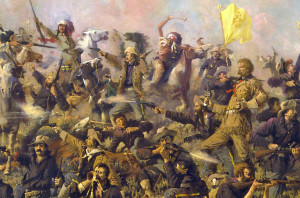No matter how big a battle is, no matter how violent, someone always survives. (Except those 300 Spartans. But then, the Greeks weren’t in it to get out of it.)
Even Little Big Horn.
Of all the battles on the American frontier, this is the one most people remember.
Maybe because the Indians won. Maybe because George Custer tried for glory and failed. Maybe because the Hunkpapa Sioux killed every single white soldier.
Every single soldier.
Except Frank Finkel.
According to the Indians, as many as 12 soldiers escaped the battlefield. All but one were either tracked and killed. Or they killed themselves to avoid capture.
Every member of the 7th Cavalry died.
Except Frank Finkel.
The Indians seemed to want everyone dead.
And they were enthusiastic in making sure it happened.
Frank Finkel just got lucky.
Someone had to.
And, on June 26, 1876, it was Frank.
You couldn’t have picked it before the battle. Frank, apparently, wasn’t the most athletic soldier.
But that’s luck for you.
We often overlook the role of luck in any endeavour.
Maybe it’s because, to acknowledge luck somehow diminishes the role of skill.
Malcolm Knox said it best in his article, “Luck’s a fortune“. He looks at Stuart Broad’s 8 for 15 in the first innings of the recent fourth Ashes test. Stu got lucky.
Battles revolve around luck.
Great sporting teams openly acknowledge the role of luck.
Maybe, in marketing, we only acknowledge bad luck.
I’m not suggesting everything that goes wrong should be labeled “bad luck” and forgotten. Not every ego should be able to shrug their shoulders and put a bad result down to Pallas Athena having a fight with Apollo.
Think of luck as a result outside the expectations.
Expectations are set by the rules and frameworks around a discipline.
The first rule of advertising is to get noticed.
Egos often give into the temptation to add their fingerprints to a winner. Too many fingerprints obscure the clarity of an idea. Obscure ideas often don’t work.
That’s not bad luck. That’s bad ego.
The second rule is to be remembered.
A lot of brand theory is based on studies of memory, emotion and the cultural and physiological triggers which trigger desire. There is no formula for this. There are simply too many variables. Science is an ally. But it’s not a crutch. As Seth Godin notes, science can be great for direct response advertising, but it’s lousy at brand advertising. Science is good at measuring what has been remembered – but it’s not so good at creating memories.
We do know the campaigns that get remembered tend to be luckier than the ones that get forgotten. But we insist on research and science, because science is very, very good at looking confident. Which might be why the world is littered with over-researched, over-budgeted, over-stakeholdered ads that make Waterworld look like Gone With The Wind. And blessed with non-sensical success stories like Pet Rocks.
Sometimes, you just get lucky.
No one has done any research into the success of campaigns built on piles of research and bleached a pale yellow by the filtered sunlight in C-Suite boardrooms versus campaigns cobbled together with just an idea and a lot of enthusiasm.
Anything I know about statistics (and it’s not much, to be fair) suggests a brand ad has as much chance of succeeding no matter if it’s researched to death or if good people just went on gut feel. Boards and management committees want to remove any chance of luck being involved in any action. But luck will play its part.
When in doubt, just make a decision.
As Frank Finkel can tell you.
Sometimes, you just need to believe you’ll get lucky.


Leave A Comment